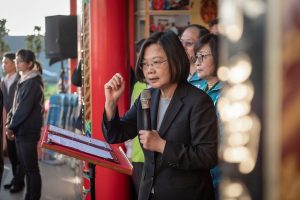With just four weeks to go until Taiwan’s presidential election in January, observers are largely in agreement: President Tsai Ing-wen’s chances for reelection are looking increasingly robust.
The contest is a three-way race between Tsai, the incumbent candidate of the ruling Democratic Progressive Party (DPP); Han Kuo-yu of the opposition Chinese Nationalist Party (KMT); and James Soong of the People First Party (PFP), a minor party.
Last year at this time, the Tsai administration suffered a major defeat in local elections and Tsai’s approval rate was in the cellar. Her prospects for reelection appeared dim. The situation began to change quietly in January this year and then more dramatically in June and July.
Chinese leader Xi Jinping made a major address on Taiwan in January, in which he emphasized his resolve to unify Taiwan under the banner of “One country, two systems.” Tsai quickly responded: “The Taiwanese people will never accept ‘One country, two systems.’” Although Tsai’s robust response was welcomed by Taiwanese youth, most people were largely unmoved.
“One country, two systems” has always seemed remote and unrealistic in Taiwan, but when massive protests broke out in Hong Kong in June, Taiwanese realized that the issue was much more pertinent than they had thought, and that Hong Kong today might well be Taiwan tomorrow. Those who were impressed and dismayed by what was happening in Hong Kong turned to Tsai, and her ratings climbed.
Xi’s Taiwan address and the Hong Kong protests are the external factors boosting Tsai’s ratings. The internal factors, meanwhile, involve the difficulties and dilemmas besetting the KMT.
Han Kuo-yu won a surprise victory in the Kaohsiung mayoral race last year and enjoyed very impressive support in opinion polls in the first half of this year. But his poll numbers have gradually declined, to the point where he has been lagging behind Tsai since August.
Han’s rise and fall is an interesting phenomenon. A KMT outsider, Han was largely ignored during the Ma Ying-jeou era. But KMT’s deep-blue supporters, with their strong affinity with Chinese nationalism, were becoming increasingly cognizant of the reality of Taiwanese society, with its rising Taiwanese identity over the past twenty years. This instilled within them a deep sense of alienation, victimization and impatience.
Ultimately, KMT supporters ran out of patience with the establishment, of which Ma Ying-jeou was the leading figure, as Ma and other leaders proved unable to resist the tide of Taiwanese identity.
They found their man in Han Kuo-yu, unusually combative, enthusiastic and seemingly able to defend ROC values in Taiwan. Han was successful in appealing to deep-blue supporters, earning a reputation for being close to ordinary voters, a far cry from the aloof bearing of the KMT’s traditional elite.
These supporters, called “Han maniacs,” elevated Han to presidential nominee. Ultimately, though, they were a minority, possibly some twenty percent of the overall electorate, and Han’s political position, friendly to Beijing and inclined to right-wing populism, started to erode his support.
Losing power in 2016 created a serious crisis for the KMT. At a time of troubles with its support base, party finances and personnel, the KMT faces an existential question with its party line. With its origins in Chinese nationalism, the KMT is at odds with the Taiwanese identity, which has dominated since the Lee Teng-hui period. To counter the rise to power of the DPP, the KMT chose to collaborate with the Chinese Communist Party (CCP) in 2005.
The CCP had gradually increased its influence over the KMT, and by 2015 the KMT had become a political party that relied on Chinese influence to contest Taiwanese elections.
The political and economic structure of postwar Taiwan was “pro-U.S., anti-communism.” This structure was established and maintained with a heavy hand by Chiang Kai-shek and Chiang Ching-kuo, and it became entrenched in the minds of Taiwanese.
Just as the KMT has moved away from this position, the DPP and Tsai have stepped in to inherit it.
The KMT still proclaims itself a “pro-U.S. party,” but its inclination toward Beijing at a time of U.S.-China tensions has made it difficult for it to escape the tag of a “pro-China party.” This in turn explains why Tsai Ing-wen, having recovered from last year’s drubbing, has emerged as ascendant in the 2020 election campaign.
Indeed, the DPP’s position has also gradually improved in the legislative election, due to be held on the same day as the presidential election, and it will probably come close to maintaining its majority in the legislature, although it may lose some seats.
A Tsai win would obviously be a setback to Beijing’s policy towards Taiwan, but it would not mean an easing of Taiwan Strait tensions. On the contrary, Beijing will react by ratcheting up the pressure on Taiwan in hopes of achieving something before the centenary celebration of the CCP’s foundation in 2021. Neighboring countries including Japan must be aware of this, and prepare for cross-Strait turbulence.
Yoshiyuki Ogasawara is an associate professor at the Institute of Global Studies, Tokyo University of Foreign Studies.

































